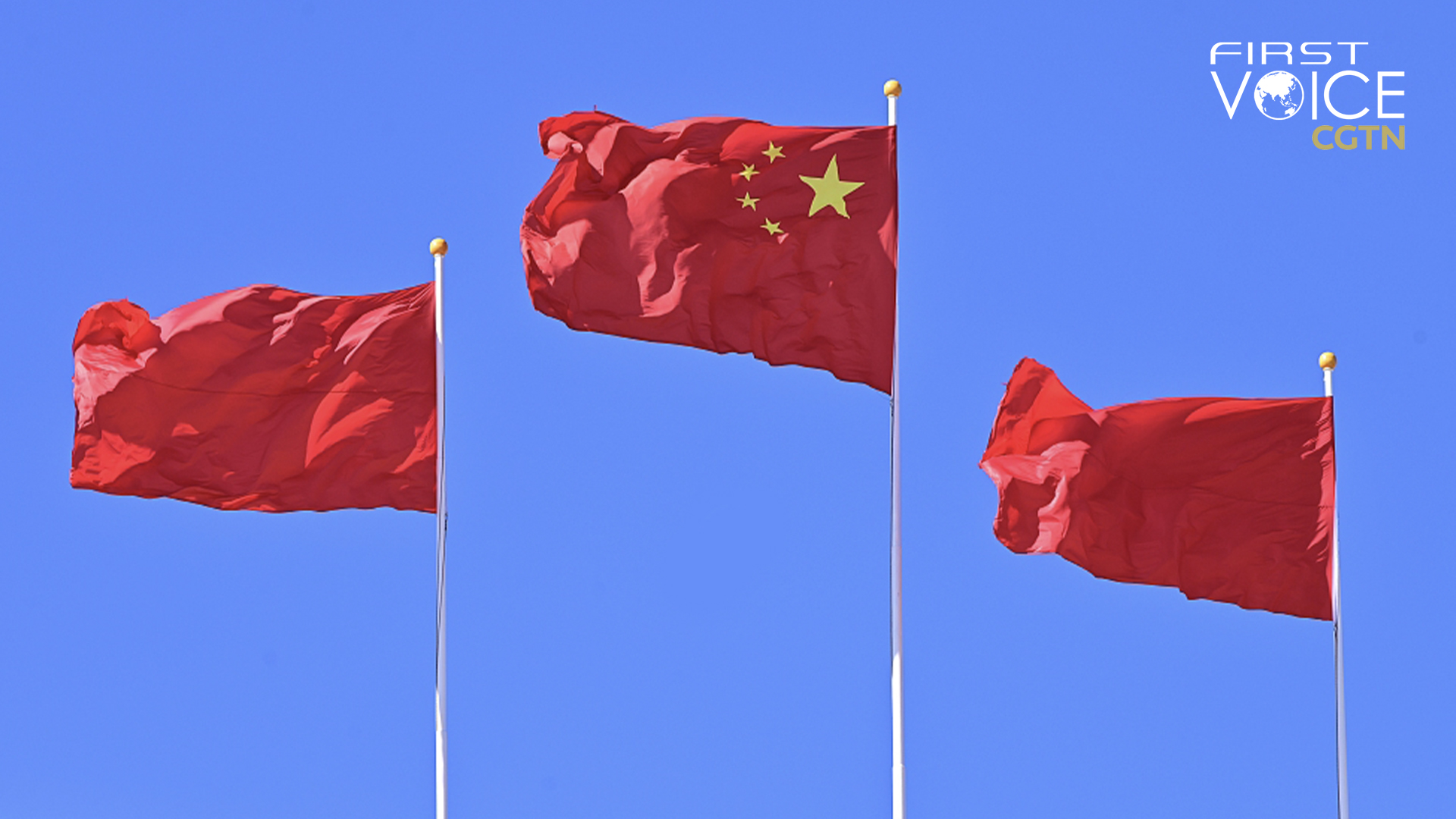
China has always been on the side of solidarity and cooperation, on the side of the trend of the times, and on the side of the common interests of the vast majority of countries. [Photo/CGTN]
Editor's note: CGTN's First Voice provides instant commentary on breaking stories. The daily column clarifies emerging issues and better defines the news agenda, offering a Chinese perspective on the latest global events.
The past decade has seen China actively participating in the reform and improvement of the global governance system. However, some Western governments led by the United States and a section of the media fallaciously project China as a threat to the current international order as part of a relentless slanderous propaganda campaign against China.
The U.S. has made this line of thought official by naming China as its top rival in the Biden administration's recently released National Security Strategy. The document describes China as "the only competitor with both the intent to reshape the international order and, increasingly, the economic, diplomatic, military, and technological power to do it."
Such false alarms and groundless concerns over the fanciful notion that China is trying to change the international order have become the predominant narrative in most Western capitals, and, in recent years, increasingly being absorbed in their official policy statements on China.
The anti-China campaign is actually rooted in the Western fears of an imminent end to their dominance in international affairs with China and other emerging countries making rapid strides in recent years and increasing their shares and stakes significantly in the global economy, politics and governance amid calls of a more equitable multi-polar world order.
With China projected to overtake the U.S. as the world's largest economy in less than a decade, the unease in the West is palpable. The day China takes that spot sometime around 2030, it will be the first time in nearly three centuries that a non-Western country will be the world's top economic power and an end to the U.S.-led Western hegemony.
The past three centuries of the Western era have been one of brute economic, political and military dominance and exploitation through forced subjugation of much of the developing world – first through colonization and then consolidating and perpetuating its hegemony in the post-World War and Cold War world order by controlling key global governance organizations including the United Nations and the Bretton Woods institutions.
The U.S. and its Western allies are evidently terrified of a potential scenario where they don't have absolute control over global governance. In their fear, they project their own hegemonic attributes onto the rising power – China. They can't possibly fathom that, unlike the U.S., the world's potential new top power, won't act as a bully and misuse the global instruments of governance to single-mindedly perpetuate its own perceived supremacy. It is not in China's nature.
China has always been on the side of solidarity and cooperation, on the side of the trend of the times, and on the side of the common interests of the vast majority of countries, since the 18th National Congress of the Communist Party of China, Chinese Foreign Ministry Spokesperson Wang Wenbin stressed at a press conference in Beijing on Wednesday, responding to a question on the Western fears over the so-called "China threat."
"We have participated in the reform and improvement of the global governance system with unprecedented breadth, depth and strength, worked to build a new type of international relations featuring mutual respect, equity, justice and mutually beneficial cooperation, and promoted the building of a community with a shared future for mankind," Wang said.
"China is a staunch defender of the existing international order. We have always firmly upheld the international system with the UN at its core, the international order underpinned by the international law and the multilateral trading system centered on the World Trade Organization," he added.
China is an active contributor to world peace, common development and response to global challenges. Chinese President Xi Jinping has proposed a united, equal, balanced and inclusive global development partnership and a vision of common, comprehensive, cooperative and sustainable security, and put forward the Global Development Initiative (GDI) and the Global Security Initiative (GSI), which are welcomed by the international community.
Put forward by Xi a year ago, the GDI has been widely supported and well-received by the international community. More than 100 countries and many international organizations have supported the GDI and nearly 60 countries have joined the Group of Friends of the GDI. The GDI has been incorporated into the cooperation documents between China and ASEAN, Central Asia, Africa, Latin America and the Pacific Island countries.
The GDI is an example of China contributing its solutions to addressing the global governance deficit and other global challenges. It is a vivid illustration of building a community with a shared future for mankind that demonstrates the sense of responsibility of China's diplomacy in the new era.
China has worked for the G20's transition into a mechanism of long-term governance. It initiated the establishment of the Asia Infrastructure Development Bank (AIIB) and the New Development Bank (NDB) to build new cooperation platforms for global economic governance and foster an open world economy.
China is committed to deepening BRICS cooperation and has put in place an extensive BRICS-plus platform, and kept improving the representation and say of emerging markets and developing countries in international affairs.
China's track record proves that it is a responsible major country working to reform and improve the global governance system, and certainly not a threat to the current world order as the West would have you believe. China calls for a vision of global governance featuring extensive consultation, joint contribution and shared benefits. China also remains committed to multilateralism.

 中文
中文



